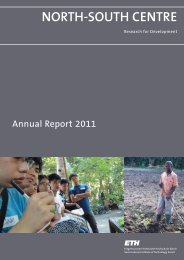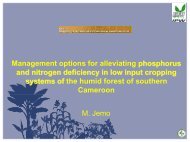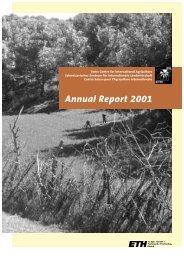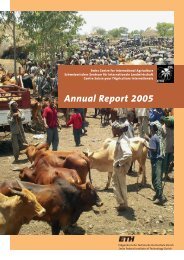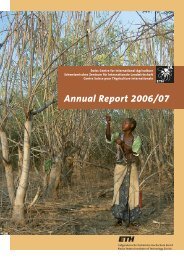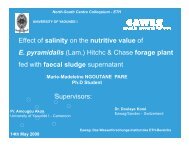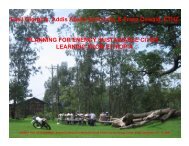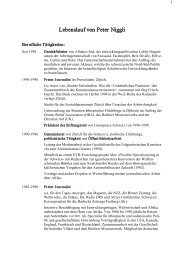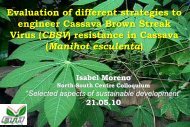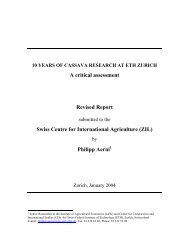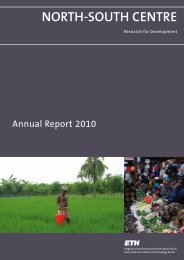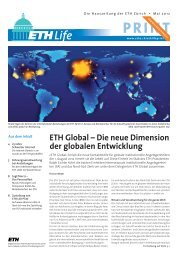NORTH-SOUTH CENTRE - ETH - North-South Centre North-South ...
NORTH-SOUTH CENTRE - ETH - North-South Centre North-South ...
NORTH-SOUTH CENTRE - ETH - North-South Centre North-South ...
Create successful ePaper yourself
Turn your PDF publications into a flip-book with our unique Google optimized e-Paper software.
The partnership between UNEP<br />
and the <strong>ETH</strong> Zurich<br />
In November 2005, the United Nations Environment Programme<br />
(UNEP) and the <strong>ETH</strong> Zurich signed a Memorandum<br />
of Understanding (MoU) to formally establish cooperation<br />
between the two institutions. On the side of the <strong>ETH</strong> Zurich,<br />
the <strong>North</strong>-<strong>South</strong> <strong>Centre</strong> was given the operative mandate<br />
for the implementation of the MoU.<br />
In 2008, an interdisciplinary research group coordinated by<br />
Stefanie Hellweg developed several interlinked projects<br />
on assessing and compensating the ecosystem impacts<br />
of biophysical products in a <strong>North</strong>-<strong>South</strong> context. The<br />
projects were accepted for funding by the <strong>ETH</strong> Zurich<br />
research commission and started in 2009. An outline<br />
of the projects is presented on the following pages. In<br />
the light of this interdisciplinary research programme,<br />
the MoU was renewed in 2009 with a sharper focus on<br />
the ongoing activities. The collaboration between the <strong>ETH</strong><br />
Zurich and UNEP is now focused on, but not limited to:<br />
<br />
<br />
<br />
<br />
<br />
investigating sustainable management of ecosystems<br />
through compensating ecosystem damage by global<br />
offsetting schemes, including payments for ecosystem<br />
services and their monetary valuation;<br />
classifying critical ecosystem services with particular<br />
emphasis on regulating functions;<br />
assessing environmental changes and trends, as well<br />
as interlinkages between the natural environment and<br />
socio-economic processes at different spatial scales;<br />
analysing sustainable production and consumption, notably<br />
through life cycle assessment;<br />
setting-up a library of case studies in which the developed<br />
methodologies are applied and the offsetting<br />
scheme is elaborated.<br />
Stefanie Hellweg, Michael Curran, Francesca Verones (all<br />
from the Institute of Environmental Engineering) with<br />
Barbara Becker and Manfred Kaufmann (both from the<br />
management team of the <strong>North</strong>-<strong>South</strong> <strong>Centre</strong>) formed a de-<br />
legation of the <strong>ETH</strong> Zurich who attended a kick-off workshop<br />
at the UNEP headquarter in Nairobi in June 2009. The workshop<br />
allowed the delegation to present and discuss the projects<br />
conducted at the <strong>ETH</strong> Zurich and to receive feedback<br />
from UNEP representatives of different divisions, namely the<br />
Division on Early Warning and Assessment and the Division<br />
of Technology, Industry and Economics. As an immediate result<br />
of the workshop, three thematic feedback groups were<br />
established: on land, on water and on offsetting. These<br />
groups will form an advisory board for the three doctoral<br />
theses and provide feedback to intermediary results. UNEP<br />
suggested various case studies for the <strong>ETH</strong> research projects.<br />
It was also agreed that UNEP representatives will try to<br />
formally include the <strong>ETH</strong> projects in the UNEP Programme<br />
of Work. In addition, the workshop allowed the establishing<br />
or intensification of contacts with several high-ranking<br />
UNEP officials, among them Angela Cropper, UNEP Deputy<br />
Executive Director, who agreed to come as keynote speaker<br />
to the “Tropentag 2010” in Zurich.<br />
For UNEP, the partnership with the <strong>ETH</strong> Zurich is an important<br />
element in the ongoing initiative of strengthening the<br />
science-policy interface by bringing scientists and policymakers<br />
together. The <strong>ETH</strong> Zurich will benefit from the network<br />
of UNEP in disseminating research results worldwide<br />
and enhancing the application of the developed methods.<br />
45<br />
Research collaboration<br />
UNEP




